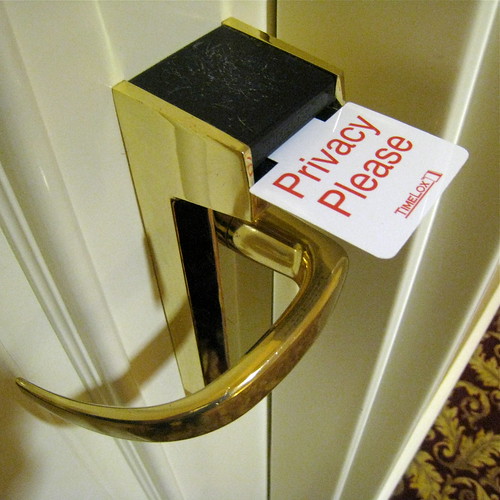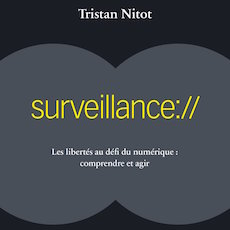This post does not reflect the views of my employer or any organization I am affiliated with. Obviously. But I felt I had to say it again, just in case.
I have been thinking about privacy in the world of Web services for several months now. I've written quite a bit, mostly in French, and most of the material I have been producing is not yet public. Then I find this article of Dan Lyons in Newsweek that remarkably nails it down: privacy is a currency for which we don't know the change rate. It's something we're giving to online services without knowing what it's worth. I wish I was able to write English this clearly...
Excerpt from Daniel Lyons' On the Web, privacy has its price, to be read carefully:
What's happening is that our privacy has become a kind of currency. It's what we use to pay for online services. Google charges nothing for Gmail; instead, it reads your e-mail and sends you advertisements based on keywords in your private messages.
The real holy grail is your list of friends. With that information, marketers can start sending more targeted messages. If you like a certain movie, or album, or mountain bike, your friends will probably like those, too. So they'll be good targets for ads for those products. Of course, your friends are not going to buy everything you do. It's not pinpoint accuracy. But the data helps marketers "narrowcast" their advertising. And it sure beats buying commercials on TV or splattering ads all over the Internet.
The genius of Google, Facebook, and others is that they've created services that are so useful or entertaining that people will give up some privacy in order to use them. Now the trick is to get people to give up more—in effect, to keep raising the price of the service.
These companies will never stop trying to chip away at our information. Their entire business model is based on the notion of "monetizing" our privacy. To succeed they must slowly change the notion of privacy itself—the "social norm," as Facebook puts it—so that what we're giving up doesn't seem so valuable. Then they must gain our trust. Thus each new erosion of privacy comes delivered, paradoxically, with rhetoric about how Company X really cares about privacy. I'm not sure whether Orwell would be appalled or impressed. And who knew Big Brother would be not a big government agency, but a bunch of kids in Silicon Valley?
The problem with buying things with your privacy is you really don't know how much you're paying. With money, five bucks is five bucks. But what is the value of your list of friends? If it's not worth much, your membership on Facebook may be the deal of a lifetime. If it's incredibly valuable, you're getting massively ripped off. Only the techies know how much your info is worth, and they're not telling. But the fact that they'd rather get your data than your dollars tells you all you need to know.







6 réactions
1 De Hugo - 19/02/2010, 11:34
Thank you for sharing this interesting analysis.
However, this clearly puts me in an uncomfortable position… because 'privacy' is more and more difficult for me to translate into French (and so, to understand what it means).
What is your opinion about that? Do you think that the distinctions « vie privée », « intimité », « discrétion » are still relevant to explain all the different aspects of “privacy?”
2 De papagaio - 19/02/2010, 12:56
It makes me even more confident about the fact that internet is not a place of privacy, rather a huge agora where we all meet (google is a master in there, look @ what orkut worked and still works like), but we have to separate what we want to display from what we do not want...After all we have to grow and stop thinking of this place as a kid play ground and a source of fulfilling of our secret tendencies. On the contrary everything we do on internet is shown and transmitted with a loudspeaker... so why not using it and have our 15 minute of fame, like through blogging (have a glance @ mine by the way).
3 De Tony Mechelynck - 19/02/2010, 15:48
And yet there are still ways to keep your privacy private. Crypted zipfiles enjoy a "poor" grade of secrecy — about one hour for a 4-character key or one day for a 6-character key, it is said, if the cryptanalyst has a Pentium 133 and knows some cleartext that is bound to occur somewhere in the message — yet it is better than nothing. I correspond with some people in English, with others in French, with others in Esperanto, and with one in a strange mixture of English, Spanish, Esperanto and French — I wonder what Gmail makes out of that. I take some time every day to "train" my spam filters (both Gmail's "Spam" and SeaMonnkey's "Junk" filters, as I read Gmail mail by POP3) by reclassifying both false positives and false negatives, and of the "true" spam messages (which include any advertisements that Gmail's "partners" might be sending me, be it — apparently — for lotteries, Viagra substitutes, marrying Russian girls, anything written in Russian or Chinese, or helping the widow Mobutu lay hands on her deceased husband's Swiss bank account ) I rarely read more than the Subject, if even that.
) I rarely read more than the Subject, if even that.
Hugo: all three, I think, and maybe even more. The privacy of one's home = l'intimité de son foyer. To disturb s.o.'s privacy = faire intrusion chez qn. There is no privacy here = on n'est jamais seul / on n'a jamais la paix ici. The Privacy Commissioner = le Commissaire à la protection de la vie privée (Canada).
4 De Asa - 19/02/2010, 20:07
I really like Daniel Solove's taxonomy of privacy. We really do need a much cleaner way to describe privacy issues if we're going to construct rules (and software) that addresses those issues properly.
The two cases that I'm most concerned about are the ease with which large Web companies like Google can conduct nearly undetectable surveillance across most of the Web (think about how many pages have one of Google Adsense, DoubleClick banners, Google Analytics, YouTube videos, Google Maps mashups, Re-captcha logins, Blogger infrastructure, Google Site Search, all of which could be used to track your movements around the Web) and how much of our data we're willingly handing over to be stored for long periods of time in accounts we don't fully control (search records, Web mail, news readers, blogs, IM, etc.)
- A
5 De Havvy - 20/02/2010, 04:20
If you believe that you gain more net profit out of talking with others on Facebook over the loss of privacy is worth it, then there is net profit. Privacy in the sense of knowledge of a person is a privilege, not a right.
6 De Gerv - 02/03/2010, 12:01
The thing about privacy is that the exchange rate of the currency is different for different people, and the value of it (like in any exchange which benefits both parties) is not the same on each side. I may decide to put a $50 value on the privacy of my list of friends. If that list is worth $100 to Google or Facebook, and they will provide me with $70 worth of services in return for it, then clearly the exchange is a beneficial one. However, if you value your list of friends at $500, then it would not be a good exchange for you, if all else was the same.